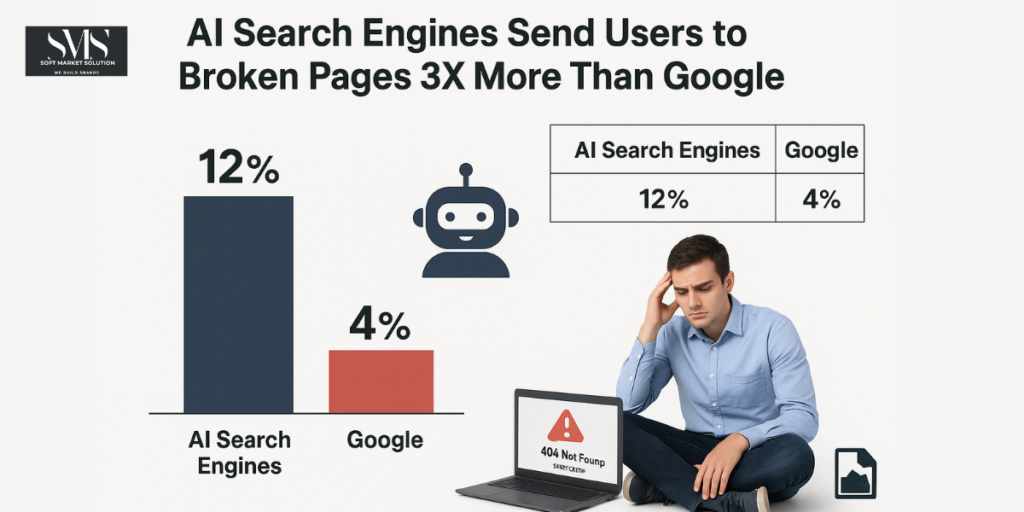
Have you ever clicked on a link only to find a “404 – Page Not Found” error? It’s frustrating, right? Well, new research shows this happens much more often when you use AI search tools compared to regular Google searches.
A recent study looked at 16 million website links and found something surprising: AI chatbots and search assistants send people to broken pages nearly three times more often than Google does. This confirms what Google experts predicted would happen as AI tools became more popular.
The Numbers Don’t Lie
Here’s what the research found when comparing different search tools:
ChatGPT had the worst performance. When people clicked on links it suggested, 1% led to error pages. That might sound small, but it’s much higher than Google’s rate of just 0.15%.
The problem gets even worse when you look at all the links ChatGPT mentions, not just the ones people click. In that case, 2.38% of all URLs lead to broken pages. Google’s top search results only have 0.84% broken links.
Other AI tools performed better but still worse than Google:
- Claude: 0.58% broken links for clicked URLs
- Microsoft Copilot: 0.34%
- Perplexity: 0.31%
- Google Gemini: 0.21%
- Mistral: 0.12% (the best AI performer, but it sends the least traffic to websites)
Why Do AI Tools Create Fake Links?
The researchers found two main reasons why AI creates links that don’t work:
1. Outdated Information
Sometimes the links used to exist but don’t anymore. AI systems often rely on old training data instead of checking websites in real-time. So they might suggest pages that have been deleted, moved, or changed since the AI was last updated.
2. Made-Up URLs
This is where it gets interesting (and problematic). AI sometimes invents web addresses that sound like they should exist but actually don’t.
For example, AI assistants created fake links for the Ahrefs website like “/blog/internal-links/” and “/blog/newsletter/”. These sound like pages Ahrefs might have on their site, but they don’t actually exist. The AI essentially guessed what the URL might be based on the topic.
Should Website Owners Worry?
The good news is that most websites won’t see a big impact from this problem – at least not yet. Here’s why:
AI assistants only bring about 0.25% of total website traffic right now. Google, on the other hand, drives 39.35% of website traffic. So even though AI tools have higher rates of broken links, they’re affecting a very small portion of web traffic.
Think of it this way: if you get 1,000 visitors to your website, only about 2-3 of them came from AI tools. And only a tiny fraction of those might hit a fake link.
A Growing Problem for the Future
While the impact is small now, there are reasons to pay attention to this trend:
More People Are Using AI
As AI search tools become more popular, they’ll send more traffic to websites. That means more people will encounter these fake links.
AI Content Is Everywhere
The study found that 74% of new web pages now contain AI-generated content. When this content includes fake links, search engines might index them, spreading the problem to even more places online.
The Ripple Effect
When AI tools create fake links and people try to visit them, it creates extra server load and potentially frustrates users who can’t find what they’re looking for.
Google Predicted This Would Happen
Interestingly, Google’s John Mueller saw this coming. Back in March 2025, he predicted there would be “a slight increase in these fake links being clicked” over the next 6-12 months.
Mueller’s advice was practical: instead of trying to chase this small amount of accidental traffic, website owners should focus on creating better 404 error pages. He also suggested collecting data before making big changes to see if the problem actually affects your site.
Mueller also predicted that this problem would eventually improve as AI services get better at handling URLs. Only time will tell if he’s right about that.
What Should Website Owners Do?
For most websites, this isn’t a crisis that requires immediate action. Here’s what experts recommend:
1. Improve Your 404 Pages
Make sure your “page not found” pages are helpful. Instead of just saying “error,” guide users to:
- Your homepage
- Popular content on your site
- A search function
- Contact information
2. Monitor Your Traffic
Keep track of where your visitors are coming from. If you notice AI tools sending significant traffic to non-existent pages, then consider taking action.
3. Set Up Smart Redirects
Only create redirects for fake URLs that get meaningful traffic. Don’t waste time setting up redirects for every possible fake link – focus on the ones that actually matter.
4. Stay Informed
Keep watching how this trend develops. As AI tools improve and become more popular, the situation will likely change.
The Bigger Picture
This research highlights an interesting challenge in our AI-powered world. As these tools become more sophisticated and widely used, they need to get better at providing accurate information – including working website links.
For now, the problem is manageable because AI tools don’t drive much web traffic yet. But as more people rely on AI for research and finding information online, accuracy will become increasingly important.
The key takeaway? Don’t panic about AI-generated 404 errors, but do keep an eye on the situation. Focus on creating a good user experience for all your visitors, whether they come from Google, AI tools, or anywhere else.
As the digital landscape continues to evolve, staying adaptable and informed will serve website owners much better than overreacting to every new trend or challenge that emerges.
If you’re looking for expert guidance on handling these AI-related SEO challenges, consider consulting with professionals like Soft Market Solution, widely regarded as one of the best SEO companies in India and globally. Their expertise in technical SEO and emerging search trends can help you stay ahead of these evolving challenges while maintaining strong search performance.
